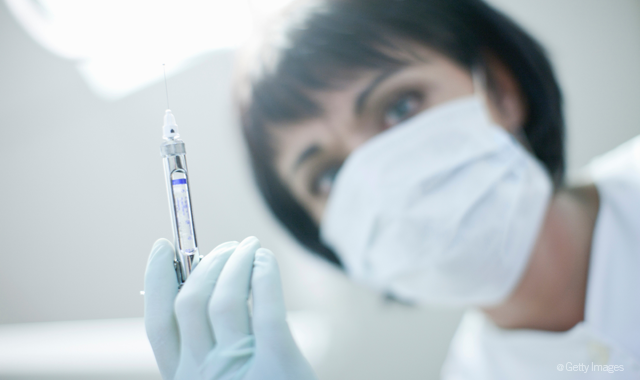New research discovers way to eliminate needles for dental anesthetic
A new study from the University of São Paulo found that there might be no need for needles when administering anesthetic for dental procedures.

It may be scary to get into the dentist’s chair, but thanks to new research, there’s one thing uneasy patients might not have to worry about anymore: needles.
A new study from the University of São Paulo found that there might be no need for needles when administering anesthetic for dental procedures. Instead, dentists could use a small electric current to give the anesthetic, saving time, money and unnecessary patient anxiety-which could potentially get more patients into the chair for procedures they might otherwise avoid because of a fear of needles.
“Needle-free administration could save costs, improve patient compliance, facilitate application and decrease the risks of intoxication and contamination,” explained study author Professor Renata Fonseca Vianna Lopez of the University of São Paulo. “This may facilitate access to more effective and safe dental treatments for thousands of people around the world.”
Trending article: Is dental anesthesia destroying children's teeth?
When administering dental anesthesia, dentists first have to take the additional step of applying a topical painkiller to reduce the pain of giving the pain-reducing anesthetic injection via needle-a seemingly redundant process that takes time and costs dentists money as they dispense multiple products. These topical painkillers, which most commonly contain lidocaine and prilocaine, come in hydrogels, sprays or ointments. Researchers wanted to see if there was a quicker and more effective way to administer these anesthetics into the body, without necessitating a needle in the process.
The research team decided to examine iontophoresis, a technique that introduces medical compounds into the body through the skin by applying a localized electric current. Although iontophoresis has been proven successful in the introduction of drugs through biological membranes, its effects had not been explored in mucosa.
“The aim of this work was to investigate the influence of iontophoresis in the mucosal penetration of prilocaine hydrochloride (PCL) and lidocaine hydrochloride (LCL), which are largely used in dentistry as local anesthetics,” the study reported. Researchers also noted that the results could have implications for non-dental purposes as well, such as cancer treatment and treatment of skin and eye diseases.
Trending article: Study finds home care of children crucial after oral sedation
To test the theory, researchers mixed the anesthetic hydrogels with a polymer to enable it to stick to the mouth’s lining, and added PCL and LCL. They tested the formula on the mouth of a pig, and the results were promising: Ionophoresis allowed the PCL to enter the body more quickly and effectively, and increased the permeation through the mouth lining by 12-fold.
“Applying iontophoresis to a semisolid formulation of this drug combination can serve as a needle-free strategy to speed the onset and prolong the duration of buccal anesthesia,” the study concluded.
As a result of the promising discovery, the researchers will now try to develop an iontophotetic device designed specifically for use in the mouth.
The full study, “Needle-free buccal anesthesia using iontophoresis and amino amide salts combined in a mucoadhesive formulation,” was published in Colloids and Surfaces B: Biointerfaces.
Oral Health Pavilion at HLTH 2024 Highlighted Links Between Dental and General Health
November 4th 2024At HLTH 2024, CareQuest, Colgate-Palmolive, Henry Schein, and PDS Health launched an Oral Health Pavilion to showcase how integrating oral and general health can improve patient outcomes and reduce costs.
Episode 31: Dentsply Sirona Implant Announcements
September 30th 2021DPR’s Editorial Director Noah Levine sat down with Gene Dorff, Dentsply Sirona’s group vice president of implants and Dr. Dan Butterman to review several big announcements the company made in the arena of implants during Dentsply Sirona World 2021 in Las Vegas.